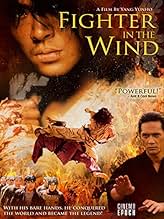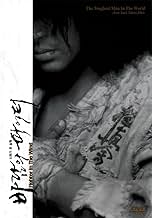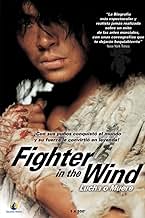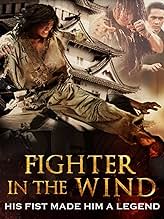IMDb RATING
6.9/10
4.3K
YOUR RATING
It is a Korean boy who went to Japan and started to learn Karate from his brother.It is a Korean boy who went to Japan and started to learn Karate from his brother.It is a Korean boy who went to Japan and started to learn Karate from his brother.
- Awards
- 1 win & 2 nominations total
Kim Won-shik
- Boy
- (as Won-sik Kim)
- Director
- Writers
- All cast & crew
- Production, box office & more at IMDbPro
Featured reviews
One major problems I had with this movie is the almost utter lack of character development. The protagonist has very little conversation that reveals his thoughts. Instead the director focuses on his determination, which is shown soley through actions, rather than words that might provoke a deeper understanding of the character. To sum up my knowledge of the characters: Baedal wants to be the best fighter, his best friend is a goof, and the bad guy is harsh and hates Baedal. Thats about as deep as it gets. Slight exagerration, but you see what I mean (and I do mean SLIGHT).
The second shortcoming was Baedal's transformation to a great fighter. For the most part is was glossed over and unrewarding. We get a glimpse of the brutal training he endured, and then miraculously he is like a whole different fighter. When this movie is about the transformation from an average fighter to the "best" in Japan, I expect a little more than that.
Lastly I have to knock it down a point for the style of the film. It seems like during some fights they decided to arbitrarily add in special effects. These detract from the movie, especially because the rest of the movie is not stylized in that manner (Kill Bill for example). Also, some of the sets and characters/costumes seemed a little cheesy, making me think it was a relatively low budget film. Not what I would expect for a movie from 2004.
The disappointing part of this movie is really that they could have done a lot better. The story itself has plenty of interesting aspects that are great for a movie. However, the way they chose to present was just plain dull, largely due to the reasons I have expressed above. While I was watching, it gave me the attitude, "Oh, hes gonna fight this guy, maybe it will be cool", "Okay, this is boring, when is the next fight?." And its not at all because I'm obsessed with fighting, its because the scenes between fights were really lacking.
If you want to see a great coming of age/martial arts movie about determination and deep characters, I recommend "Once Upon A Time in High School". It has everything that this movie lacked.
The second shortcoming was Baedal's transformation to a great fighter. For the most part is was glossed over and unrewarding. We get a glimpse of the brutal training he endured, and then miraculously he is like a whole different fighter. When this movie is about the transformation from an average fighter to the "best" in Japan, I expect a little more than that.
Lastly I have to knock it down a point for the style of the film. It seems like during some fights they decided to arbitrarily add in special effects. These detract from the movie, especially because the rest of the movie is not stylized in that manner (Kill Bill for example). Also, some of the sets and characters/costumes seemed a little cheesy, making me think it was a relatively low budget film. Not what I would expect for a movie from 2004.
The disappointing part of this movie is really that they could have done a lot better. The story itself has plenty of interesting aspects that are great for a movie. However, the way they chose to present was just plain dull, largely due to the reasons I have expressed above. While I was watching, it gave me the attitude, "Oh, hes gonna fight this guy, maybe it will be cool", "Okay, this is boring, when is the next fight?." And its not at all because I'm obsessed with fighting, its because the scenes between fights were really lacking.
If you want to see a great coming of age/martial arts movie about determination and deep characters, I recommend "Once Upon A Time in High School". It has everything that this movie lacked.
I was impressed and satisfied with Fighter In The Wind. Most martial arts movies tend not to be very serious, but in terms of grit and realism, this was one of the few martial arts movies that maintained complete seriousness throughout.
Apparently, it is biographical of a real karate master, which I didn't realize until the end. It is also apparently based on a comic book version of the story, which in hindsight is easy to see in the colorful and visually well-arranged cinematography. Many different environments, landscapes and buildings are encountered in the course of the story, and they are all beautifully presented. The director is a master at his craft.
Baedal's geisha girlfriend, played by Aya Hirayama, is absolutely stunningly beautiful, and the movie is worth watching just for her. But it is a good movie in its own right, with a good portrayal of the Korean minority in Japan just after World War II. Although parts of the story and characters lack depth, I do find the movie generally satisfying, except in one respect: As the other commentators point out, it doesn't have a great deal of fighting, and the fights it does have are brief and relatively unimpressive - all the more so because Baedal apparently doesn't use any specific style. It doesn't ring true, either, that he gets to challenge every kind of martial arts school, from karate to judo and others. Would such schools accept challenges from someone with such an unspecific fighting style? I doubt it. But, I'm no expert on this.
In any case, despite these flaws, I think the overall style of the movie is very well made, and I enjoyed it a lot. I'd definitely recommend it to any fan of martial arts and action movies.
My rating: 7 out of 10.
Apparently, it is biographical of a real karate master, which I didn't realize until the end. It is also apparently based on a comic book version of the story, which in hindsight is easy to see in the colorful and visually well-arranged cinematography. Many different environments, landscapes and buildings are encountered in the course of the story, and they are all beautifully presented. The director is a master at his craft.
Baedal's geisha girlfriend, played by Aya Hirayama, is absolutely stunningly beautiful, and the movie is worth watching just for her. But it is a good movie in its own right, with a good portrayal of the Korean minority in Japan just after World War II. Although parts of the story and characters lack depth, I do find the movie generally satisfying, except in one respect: As the other commentators point out, it doesn't have a great deal of fighting, and the fights it does have are brief and relatively unimpressive - all the more so because Baedal apparently doesn't use any specific style. It doesn't ring true, either, that he gets to challenge every kind of martial arts school, from karate to judo and others. Would such schools accept challenges from someone with such an unspecific fighting style? I doubt it. But, I'm no expert on this.
In any case, despite these flaws, I think the overall style of the movie is very well made, and I enjoyed it a lot. I'd definitely recommend it to any fan of martial arts and action movies.
My rating: 7 out of 10.
To be quite honest, I didn't know anything about this film before I had purchased it. In fact, I had only bought it for two reasons. The first was that I knew it was a martial arts film and two, because it featured Masayo Kato, who appears in a few movies that I happen to like. However, by the time I had finished watching the movie, I had to admit that it exceeded my expectations for a few reasons. For instance, it had some drama, which most martial arts films tend to lack; the picture quality was superb; and above all, it was an autobiographical sketch based on a real life martial arts master.
I won't go over the story, as I'm sure that a few other people had already given it away anyway. But to those who have criticized the film on the basis that it was "boring" just because the fights were too quick and not very well choreographed, I think it's important for them to acknowledge the fact that this was based on a true story. Most fights really did end relatively quick because of Choi Bae-dal's lethal blows. In fact, it was said that most fights between him and his opponents did not last more than three minutes, while other matches ended with only single blows coming from one of Bae-dal's kicks or punches.
Needless to say, I did enjoy the film as I've already emphasized above and was glad that I saw it for another reason: because I would not have embraced Bae-dal's depicted character with the same respect that I currently have for the other great martial arts legends, the likes of which include Musashi, Bruce lee, Wong Fei Hong, et al.
8 out of 10
I won't go over the story, as I'm sure that a few other people had already given it away anyway. But to those who have criticized the film on the basis that it was "boring" just because the fights were too quick and not very well choreographed, I think it's important for them to acknowledge the fact that this was based on a true story. Most fights really did end relatively quick because of Choi Bae-dal's lethal blows. In fact, it was said that most fights between him and his opponents did not last more than three minutes, while other matches ended with only single blows coming from one of Bae-dal's kicks or punches.
Needless to say, I did enjoy the film as I've already emphasized above and was glad that I saw it for another reason: because I would not have embraced Bae-dal's depicted character with the same respect that I currently have for the other great martial arts legends, the likes of which include Musashi, Bruce lee, Wong Fei Hong, et al.
8 out of 10
'Paramui Paito (Fighter in the Wind) is based on the events in the life of legendary Korean martial artist Choi Bae-dal. Or more precisely, the film is based on the comic book based on the martial artist's life _ a difference that can be felt throughout this entertaining but factually suspect movie.
The first of a handful of local films about famous Koreans who lived during the Japanese occupation period, ''Fighter in the Wind tells of the early part of Choi¡¯s life, how he sneaked into Japan in the late 1930s in hopes of becoming a pilot, joined the martial arts community there, and after training by himself in the mountains for 18 months, came down to become the top fighter of that country.
The film offers a seemingly sentimentalized version of the same story, especially playing up the outsider aspect of Choi's experiences, of his being a Korean in Japanese society. Given the story's xenophobic elements, which include evil yakuzas exploiting Koreans, it will be interesting to see how a Japanese audience responds to the film when it gets released there as planned.
''Fighter¡¯s best moments hint at the moral complexity of films like ''Raging Bull,¡¯¡¯ Martin Scorcese¡¯s boxing masterpiece. At first, Choi¡¯s motivation to become Japan¡¯s best seems to be connected to righting injustices felt by Koreans in Japan, but as he travels to martial arts schools enduring punishment after punishment, it becomes less clear as to what he is trying to prove.
But such insights are all too brief in the film, which is so heavy on the melodrama and action that it's difficult to take too seriously. By the end, the story resembles a kung fu film from Hong Kong, complete with a geisha girlfriend (Ara Hirayama), who tries to turn Choi into a lover not a fighter, and elder statesmen of the Japanese martial arts community who will go to any lengths to keep a Korean from becoming Japan's best. It's not the most inventive of plots, but the film keeps it entertaining throughout.
Singer and actor Bi (Rain) was initially cast for the lead role of Choi but had to pull out due to schedule conflicts. It¡¯s a good thing too, for the rail-thin pop singer wouldn¡¯t have been able to take the physical punishment the role required.
Instead, we get Yang Dong-geun, a burly actor who plays the part to near perfection. It¡¯s refreshing to see this young and talented actor take on a substantial role for a change, and he brings to ''Fighter the necessary savagery and physical presence to make it work.
The first of a handful of local films about famous Koreans who lived during the Japanese occupation period, ''Fighter in the Wind tells of the early part of Choi¡¯s life, how he sneaked into Japan in the late 1930s in hopes of becoming a pilot, joined the martial arts community there, and after training by himself in the mountains for 18 months, came down to become the top fighter of that country.
The film offers a seemingly sentimentalized version of the same story, especially playing up the outsider aspect of Choi's experiences, of his being a Korean in Japanese society. Given the story's xenophobic elements, which include evil yakuzas exploiting Koreans, it will be interesting to see how a Japanese audience responds to the film when it gets released there as planned.
''Fighter¡¯s best moments hint at the moral complexity of films like ''Raging Bull,¡¯¡¯ Martin Scorcese¡¯s boxing masterpiece. At first, Choi¡¯s motivation to become Japan¡¯s best seems to be connected to righting injustices felt by Koreans in Japan, but as he travels to martial arts schools enduring punishment after punishment, it becomes less clear as to what he is trying to prove.
But such insights are all too brief in the film, which is so heavy on the melodrama and action that it's difficult to take too seriously. By the end, the story resembles a kung fu film from Hong Kong, complete with a geisha girlfriend (Ara Hirayama), who tries to turn Choi into a lover not a fighter, and elder statesmen of the Japanese martial arts community who will go to any lengths to keep a Korean from becoming Japan's best. It's not the most inventive of plots, but the film keeps it entertaining throughout.
Singer and actor Bi (Rain) was initially cast for the lead role of Choi but had to pull out due to schedule conflicts. It¡¯s a good thing too, for the rail-thin pop singer wouldn¡¯t have been able to take the physical punishment the role required.
Instead, we get Yang Dong-geun, a burly actor who plays the part to near perfection. It¡¯s refreshing to see this young and talented actor take on a substantial role for a change, and he brings to ''Fighter the necessary savagery and physical presence to make it work.
i cant believe the comments made about this movie!this has to be Korea's best output in the martial arts genre since musa!!the fights certainly pull no punches you can hear heads and bones crunching!!i suggest you take another look and as you will see this a fine movie!!acting is good,the locations brilliant as the camera takes you around ghetto's to the wondrous scenes in the mountains,the training he puts him self through would make rocky balboa blush!!!the ice climb is excellent,you also get a feel for the period,this guy took no prisoners i can tell you,don't be put off from some reviews see this as a ruff n tumble session of extreme!!the last shot has to be seen to be believed!!!10/10 for a real gem of the martial arts kind!!!
Did you know
- TriviaThis movie is based on the true life story of Choi Yeong-eui (who later changed his name to Masutatsu Oyama), the founder of Kyokushin Karate. Choi was born in South Korea in 1923, immigrated to Japan in 1938, and founded the Kyokushin Karate organization in 1953. Currently, Kyokushin Karate is practiced by more than 12 million practitioners in over 120 countries around the world.
- ConnectionsFeatured in WatchMojo: Top 10 Underrated Martial Arts Movies (2017)
- SoundtracksIllusive Consensus
Lyrics by Simone Simons
Music by Mark Jansen, Ad Sluijter, Coen Janssen Simone Simons
Performed by Epica
- How long is Fighter in the Wind?Powered by Alexa
Details
Box office
- Budget
- $6,000,000 (estimated)
- Gross worldwide
- $1,518
- Runtime2 hours
- Color
- Sound mix
- Aspect ratio
- 1.85 : 1
Contribute to this page
Suggest an edit or add missing content


























